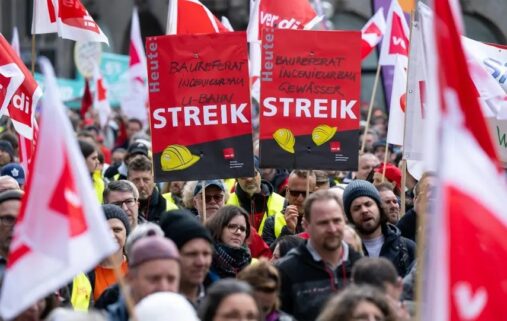“Streik” (strike), say the signs.
At the end of March, the largest strike in thirty years occurred in Germany, carried out by transport workers. Trains, seaports, airports and toll booths have been paralyzed by demands for a pay rise, in measures named by unions Ver.di and EVG.
In the UK, April started with the launch of a five-week strike by passport office workers. Security agents at London’s Heathrow airport stopped for ten days. Doctors began the 96-hour work stoppage on Tuesday the 11th, as real wages have fallen by more than 26% in the last fifteen years, according to the British Medical Association (infobae9/4).
In France, workers have been fighting since December against Emmanuel Macron’s government, which is seeking to raise the retirement age from 62 to 64.
They are signs of escalating labor conflict in Europe’s major capitalist powers, driven by inflation, which is hitting the purchasing power of wages, but also by reactionary reforms such as that of the French president.
In both Germany and England, recent measures of force were preceded by others. In the first case, there have been several (partial) warning stops in transportation this year, as well as in schools, hospitals, nurseries, and cleaning services. After the historic strike on 27 March, the third round of negotiations between the government and Ver.di failed. While unions demanded a 10.5% pay increase and a sum of 500 euros in the first month of the agreement, state employers offered roughly half, despite the fact that inflation marked a year-on-year increase of 8.7% in February. . Now that the reconciliation period has started ending on April 13, after which the union is free to take steps indefinitely.
German Interior Minister Nancy Faeser called for “responsibility” from workers. While he inked on the strikers, on the company’s board of directors they earned – if bonuses were included – up to eighty or a hundred times more than employees earned, according to the union (Without permission8/4).
At the same time as aspirational for workers to resign themselves to lost income in the face of inflation, the German government (the social democratic, liberal and green coalition) is also studying an increase in the military budget for 2024, and already owes millions of dollars to strengthen the armed forces, as part of of the tension between imperialism and Russia.
In Great Britain, one of the major railroad workers’ conflicts that had been raging for months appeared to be entering a defining moment. The RMT Union has reached an agreement with Network Rail companies (a 14.4% increase for the lowest category, and 9.2% for the highest) and has suspended a 48-hour strike at the Rail Delivery Group (RDG), which represents a dozen carriers, ahead of the bid. new business. But bids in the health sector, public departments, bookstores and museums have been in full swing.
In the two weak links in Europe, such as Portugal and Greece, important measures have also been opened in recent weeks. In addition to the massive mobilization of teachers in the first named countries, a strike by railway workers has now been added, which will last the whole month of April.
In the land of Hesiod and Homer, meanwhile, the collision of two trains, which disputed the emptying of the railroads, sparked a strike in the sector and two general strikes. The Spanish state, for its part, has been plagued by strikes and important mobilizations in the health sector.
The bottleneck in much of this process is the union leaders themselves. In France, for example, the CFDT – with the largest number of affiliates – opened negotiations with Macron, though he remains undaunted in his push for reforms. In Germany, the top leaders of the striking unions were members of the Social Democracy, which was in the government and was one of the pillars of the regime. These sectors play the role of containment and not release of the energy of the proletariat. However, they find it difficult to manage conflict, given the depth of crises and attacks, as well as the will to fight among workers.

“Internet trailblazer. Troublemaker. Passionate alcohol lover. Beer advocate. Zombie ninja.”







